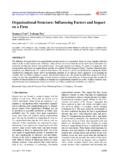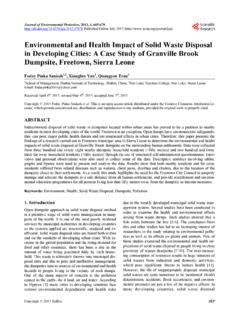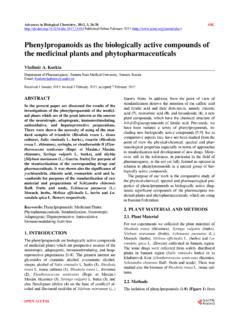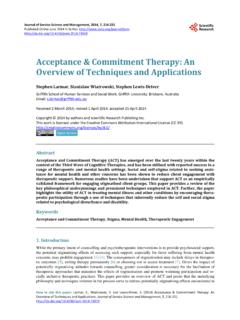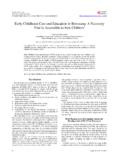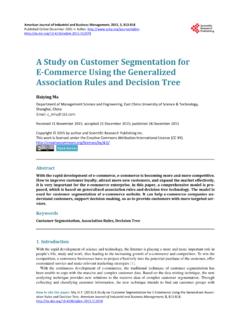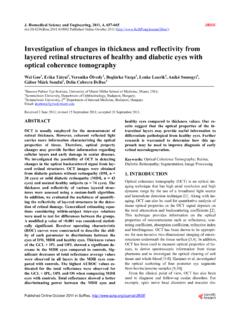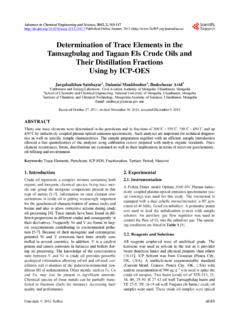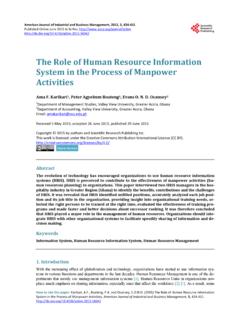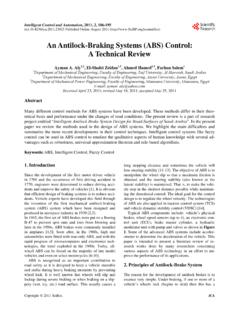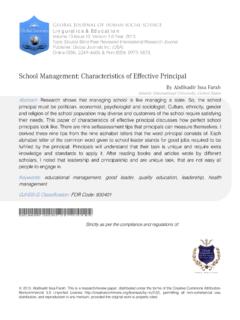Transcription of Leadership in Early Childhood Education Contexts: Looks, …
1 Creative Education , 2015, 6, 1710-1717 Published Online September 2015 in SciRes. How to cite this paper: Kivunja, C. (2015). Leadership in Early Childhood Education Contexts: Looks, Roles, and Functions. Creative Education , 6, 1710-1717. Leadership in Early Childhood Education Contexts: Looks, Roles, and Functions Charles Kivunja School of Education , The University of New England, Armidale, Australia Email: Received 12 August 2015; accepted 13 September 2015; published 16 September 2015 Copyright 2015 by author and Scientific Research Publishing Inc. This work is licensed under the Creative Commons Attribution International License (CC BY). Abstract Situated in the field of Early Childhood Education (ECE), this paper uses literature on educational Leadership to answer four questions about Leadership in ECE contexts.
2 Firstly, what is Leadership and how important is it for the success of an organisation? Secondly, what does it look like in ECE? Thirdly, what does Leadership in ECE involve? And fourthly, how does efficient and effective lea-dership function in an ECE context ? It is important to answer these questions because there is an understanding that Leadership in ECE contexts is unlike Leadership in other educational institu-tions. It requires special administrative and managerial skills to plan, organise, lead, control and direct the operations in the ECE context , as well as Leadership skills to provide an organisational vision, direction and aculturation.
3 An understanding of what Leadership in ECE contexts looks like, its roles and functions can inform ECE leaders in ways that help them to improve the efficiency and effectiveness of their educational institution. Keywords educational Leadership , Early Childhood Education Contexts, Managerial Skills, Organisational Vision, Aculturation, Organisational Structural Cultural Synergies 1. Meaning and Importance of Leadership When discussing a term such as Leadership which has been defined in many different ways, it is prudent to start the discussion with Hammersley s (1998) advice that we should define the terms we use so as to acquaint the reader with statements about how the author is going to use a term, about what meaning is to be associated with it (p.)
4 80). Whereas numerous definitions of Leadership exist, one that appears to capture very well the central meaning of Leadership is provided by Robbins, Millet, Cacciope, & Waters (1998) who say Leadership is the ability to influence others towards the achievement of goals that contribute to a worthwhile purpose (p. 396). This definition appears to strike a code of consensus among leaders in the field that Leadership is about influen-C. Kivunja 1711 cing and enabling followers to work towards the realization of organizational goals. This is important because the organizational goals are the real worthwhile purpose for the existence of any organization.
5 And so Leadership is about enabling change that helps followers to make a contribution to this change. This resonates well with Fullan (2000) who sees the new meaning of Leadership as Leadership which makes each and every educator strives to be an effective change agent (p. 13). Defining Leadership this way makes it very clear to the reader that Leadership is essential for the success of any educational organization. For example, Mulford, Silins, & Leithwood (2004) say, Leadership we know makes all the difference in success or failure of organiza-tions (p. ii). Similarly, Truskie (2002) asserts that, there is a direct link between Leadership , organizational culture and performance (p.)
6 1). Silins & Mulford (2002) also point to the important role of Leadership when they propose that Leadership .. (has) been shown to influence what happens in the core business of the school: the teaching and learning (p. 443). Fligsten & Freeland (1995) extend the importance of Leadership beyond the locality of the organization when they assert that the ability of organizational leaders to solve internal resource problems is a function of their abilities, knowledge and links with the outside world. This external linkage high-lights the importance of Leadership to coordinate and to harmonize the structural-cultural dynamics (Kivunja & Power, 2006) which foster organizational development and learning in a way that makes a positive difference to the lives of students in an ECE context .
7 As well articulated by Pace (2002), Leadership is such an important part of any workplace such that the workplace cannot be understood clearly without understanding the function of Leadership in the system (p. 33). Scott (1999) also emphasizes the importance of effective Leadership in the effective management of educational change (p. 50), within a school. Fullan (2001, p. 261), also agrees when he writes: Nowhere is the focus on the human element more prevalent than in the recent recognition of the importance of strong and effective Leadership . (And he later added:) effective school leaders are the key to large-scale, sustainable Education reform.
8 (Fullan, 2004, p. 15) The importance of Leadership is also well highlighted by Mulford (2003) who argues that whatever elements of restructuring of public schooling .. are employed, they all have in common a strong dependence on effective school Leadership for their successful implementation (p. 8). Moreover, Mulford, Silins, & Leithwood (2004) argue that, Leadership that makes a difference in organizational learning and student outcomes, is transforma-tional and distributed (p. 6). Barker & Coy (2004) also say that, the success or failure of cultural change will depend on the attitude of the Leadership team. They must be prepared to champion the beliefs and values that underpin the emerging culture (p.)
9 13). Additionally these authors affirm that at the heart of the cultural change process lies the integrity of the leader, the example set by the leader and the trust established by the leader (Barker & Coy, 2004: p. 61). As Hackman & Wageman (2005) rightly assert, traditionally, leaders behaviors and decisions, have been viewed as highly consequential for effectiveness of organizations (p. 277). Thus, there is a repeated pattern in consensus among leaders in educational change literature that Leadership plays a key role in the structural and cultural dynamics designed for school improvement. Leadership is seen as the glue that holds together the structural and cultural dynamics within an organization through the execution of informational, interpersonal and decisional roles.
10 As Scott (1999: p. 93) says: effective leaders know how best to shape culture, develop a positive working climate, communicate their service s mission and priorities, coordinate quality assurance and enhancement in learning programs and reward staff as they grapple with ongoing change. Thus, Leadership is about enabling followers to bring about desired change by setting up organizational struc-tures which enable the cultural synergies within the ECE context to be shared and dispersed within the ECE or-ganization between and among all members involved in ECE. Leadership is important because it is responsible for calling for a commitment and passion from every member of the ECE setting to make a contribution which results in a positive difference in the lives of the children in the ECE context and to help lay the foundation which will help them to develop into productive citizens who will be able to live and work productively in in-creasingly dynamically complex societies.
